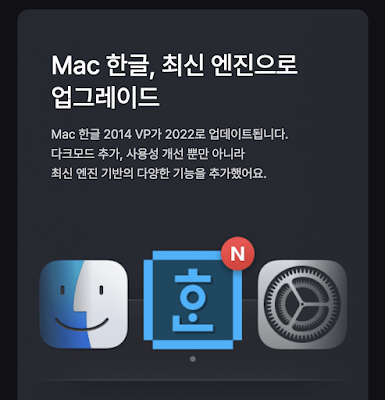Good news for Mac users in Korea. Hancom's "한글 for Mac" application, which last had a major release in 2014, is getting a major upgrade to put it more on-par with the Windows (2022) version.
 |
| Mac Hangul 2014 upgrade to 2022 teaser |
There's not much info about this update. It is being teased on Hancom's placeholder site for the upcoming revision to Hancom Space (itself formerly known as "MalangMalang"). Space will undergo a major revision to be completed in "the latter part of 2022" to become Hancom Docs, though it looks like the end of September will see the rollout.
 |
| Teaser image for Hancom Docs |
 |
| Teaser images for Hancom Docs |
But Hancom Space is changing names once again to become "Hancom Docs" (한컴독스, not "Hancom Dogs" as online translators will translate it). There are many rumors floating around about this, that it will become more like an Office 365 type subscription service. I presume there will still be a freemium option, since end users who currently have data in Hancom Space don't need to do anything to upgrade but wait until the end of September, according to an e-mail users received and the above images.
Netizens are also suspicious about whether this new Mac 2022 version will be just an automatic upgrade from the 2014 version, or a paid upgrade, or even a subscription service. The middle option looks plausible based on this line, which makes it seem like an entirely seperate download:
한글 for Mac : 한컴독스에 접속한 다음 한글 for Mac 최신 버전을 다운로드하여 설치하세요.
It looks like on the Windows front, users of the 2022 version will see the upgrade arrive as an automatic update, but 2020 users will need to revisit the site for a fresh download (which to me implies another payment, but perhaps just the codebase is too different):
한컴오피스 2022: 서비스가 개편되면 한컴오피스 자동 업데이트를 실행하여 업데이트하세요.
한컴오피스 2020: 서비스가 개편되면 한컴독스에 접속한 다음 한컴오피스 최신버전을 다운로드하여 설치하세요.
Hangul for Mac 2014 is still being sold on Hancom's website as the latest version, and has been continuing to receive service updates since at least through June 2022. (See update below). But it suffers from some lack of feature parity with the Windows version (see: example). And of course it's an Intel app so runs in Rosetta on Apple Silicon. Not that I've noticed any serious issues with that; I've been using it in this form on a Macbook for a year now with no major problems (once I ensured I had font parity with coworkers).
Leave it up to Mac users too to complain that the dock icon looks tacky with its square sides, like trying to copy the Adobe style.
Looks like we'll have to await more details on this, but in the meantime, if you've been thinking of buying Hangul for Mac 2014, maybe time to pause on that.
Comments